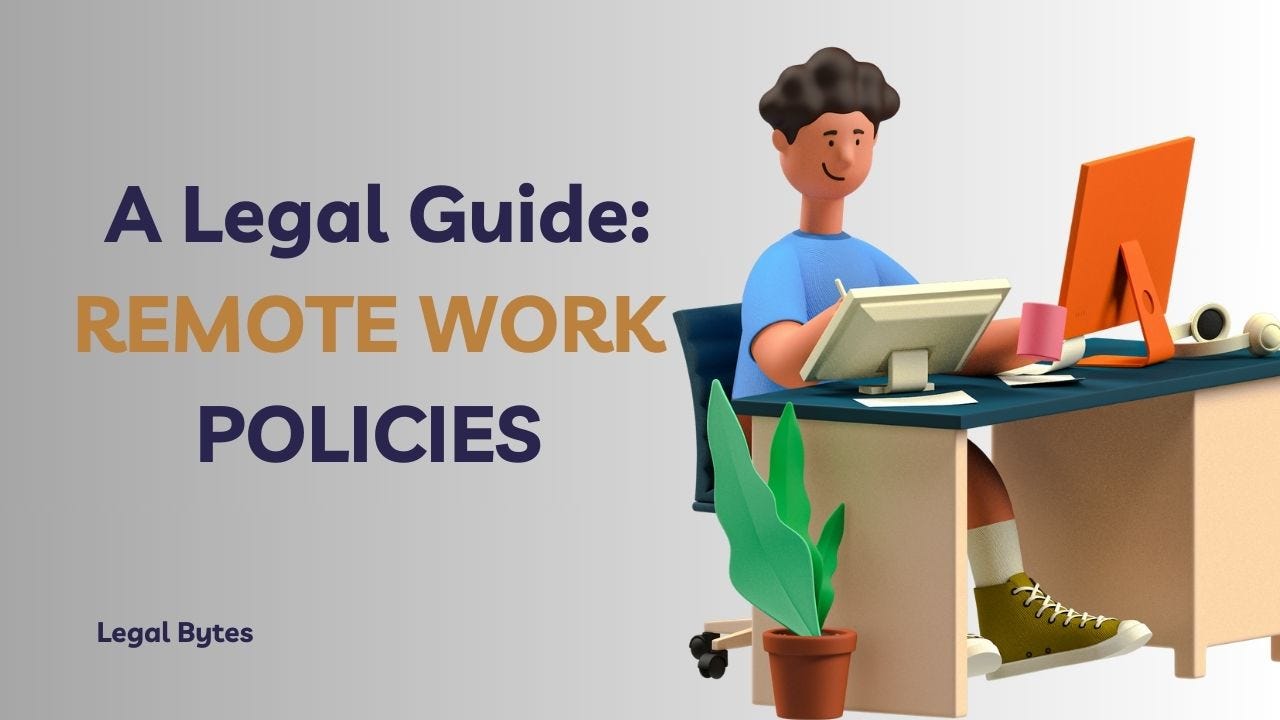A Legal Guide to REMOTE WORK POLICIES
What are the legal considerations for businesses implementing remote work policies? How can companies protect their trade secret or legally enforce non-compete agreements during remote work?
The remote work revolution has changed businesses' operations, offering unprecedented flexibility and opportunities. Along with these benefits come legal complexities that employers and employees cannot afford to overlook. Whether you’re a Nigerian entrepreneur managing remote staff or a global company with a distributed workforce across multiple countries, having a well-structured and legally compliant remote work policy is essential.
This guide will help you navigate the legal considerations of remote work, ensuring your business remains compliant and your workforce remains productive.
Although remote work was a thing before the COVID-19 pandemic, its global acceptance was fast-tracked, and the work environment quickly evolved from traditional brick-and-mortar structures and offices to remote work and work-from-home scenarios, resulting in top-down organizational restructuring.
Interesting statistics from this Forbes article show that;
As of 2023, 12.7% of full-time employees work from home, while 28.2% work a hybrid model
By 2025, 32.6 million Americans (about 22% of the workforce) will work remotely
98% of workers want to work remotely at least some of the time
93% of employers plan to continue conducting job interviews remotely
16% of companies operate fully remote.
What is a Remote Work Policy?
A remote work policy is a formal document that defines the rules, responsibilities, and expectations for employees working outside the traditional office environment. Surprisingly, most work done in a traditional office setting can be done at home or remotely as well. Remote working conditions are not limited to business models that rely heavily on communication and technology.
These policies also act as a roadmap to protect the employer and the employee while ensuring compliance with local and international labor laws. They provide for work hours and availability, communication, performance and expectation, security, and equipment.
Key Legal Considerations for Remote Work Policies
While no country has developed a law dedicated to remote work yet, this doesn’t exempt companies from complying with labor and employment, tax, data protection, intellectual property, health, or any other legal obligation. This places more pressure on employers to accurately monitor employee activity, properly classify and pay employees, protect their intellectual property, and secure the data being transmitted via communication lines.
The legal considerations employers have to grapple with include;
1. Compliance with Labor Laws
Remote work doesn’t exempt businesses from labor law obligations. They must comply with minimum wage requirements (regardless of the country their employees are based in - if the company has a global workforce), overtime pay, ensuring fair labor practices for remote workers, workplace safety, and workers’ compensation. Employers also have to ensure employees are equipped with the necessary equipment, training, and support needed to perform their duties.
In Nigeria: Employers must adhere to the Nigerian Labor Act, which governs working hours, overtime pay, and employment contracts. Ensure remote work agreements are explicitly written into contracts.
Globally: Different countries have unique regulations. For example, the European Union enforces the Working Time Directive, while the U.S. applies the Fair Labor Standards Act (FLSA).
2. Taxation and Payroll
Tax implications are often overlooked in remote work arrangements, especially for cross-border employees and this is because it can get challenging to keep track of all the tax obligations with a global workforce. Unfortunately, employers must understand payroll, income, and withholding tax requirements to ensure proper reporting, and compliance, to avoid penalties for non-compliance. In such circumstances, stay informed of tax updates, seek guidance from tax experts, and incorporate this knowledge into financial planning for legal compliance and effective tax management in a remote working environment.
In Nigeria: Employers must comply with Pay-As-You-Earn (PAYE) tax for employees working remotely within the country.
Globally: Companies should consider double taxation treaties, especially when employees reside in different countries. Consulting a tax expert is critical to avoid legal complications.
3. Data Privacy and Cybersecurity
With remote work, ensuring data protection becomes even more critical because the potential for data and privacy breaches increases. Employers must implement measures to protect sensitive information. Such measures include; training staff on data protection measures and best practices to maintain data security, having data breach and incidence protocols, using secure communication channels, encrypting data, and implementing robust cybersecurity measures to protect from cyber-attacks.
Nigerian businesses must comply with the Nigeria Data Protection Act (NDPA), which sets out standards for processing personal data.
Internationally, the GDPR (Europe) or CCPA (California) may apply to protect employee and customer data. Best practices include:
Requiring the use of secure VPNs for work access.
Regularly training employees on cybersecurity protocols.
4. Health and Safety Obligations
Even in remote work settings, employers are responsible for their employees’ health and safety, and this involves addressing physical and mental well-being. This is easily done by providing rest and break periods, workstation setups, and encouraging work-life balance or any other practice that supports their mental health. Employers are also obliged to provide easy communication channels for reporting and addressing safety concerns. Doing all this promotes the chances of increased productivity and a healthy work culture because it prioritizes employee wellness.
5. Intellectual Property (IP) Protection
To avoid disputes over ownership of work products, remote work policies must address intellectual property rights. Employees should be educated on the company’s IP policies to specify ownership and usage permissions. Including clauses in employment contracts that address IP rights, confidentiality obligations, and the handling of proprietary information creates a legal framework that protects the organization’s innovative efforts and reduces the risk of IP-related disputes.
How to Draft an Effective Remote Work Policy
When drafting your policy, include these essential elements:
Eligibility: Define who is allowed to work remotely (e.g., specific roles or departments).
Work Hours: State expected work hours, availability, and how to handle time zone differences.
Productivity Metrics: Outline how performance will be measured and managed.
Reimbursements: Address expenses related to internet access, utilities, or office supplies.
Termination Terms: Clearly outline the conditions under which remote work arrangements may be terminated.
Once the policy is drafted, the best way to implement it is to educate employees on their responsibilities, consult legal experts to ensure compliance with all applicable laws, apply it consistently, and periodically review and update the policy to match the current trends and laws.
How Can Companies Protect Their Trade Secrets in the Age of Remote Work?
According to the United States Federal Defend Trade Secrets Act (18 U.S.C. § 1839), trade secrets are any business, scientific, financial, or technical information that: (1) an owner takes reasonable steps to keep confidential; (2) derives actual or potential value from not being publically known or easily discovered, and (3) allows another person to obtain economic value from its unauthorized use or disclosure.
A company’s trade secrets are part of its intellectual property and this shift to remote work has made safeguarding trade secrets more challenging, as sensitive information is now often accessed outside the secure confines of a traditional office or office equipment. However, companies can take several proactive steps to protect their intellectual property in this new era:
1. Implement Confidentiality Agreements
Ensure all employees, whether remote or on-site, sign comprehensive confidentiality agreements. These agreements should clearly outline the employee’s obligation to protect the company’s trade secrets during and after their employment.
2. Restrict Access to Sensitive Information
Adopt a "need-to-know" policy where only employees who require access to specific trade secrets can view or use them. For instance:
Use role-based access controls in software systems.
Require two-factor authentication for accessing sensitive data remotely.
3. Train Employees on Data Security
Regular training sessions should educate employees on recognizing and mitigating security threats, such as phishing attempts. Training should also emphasize their role in safeguarding company assets.
4. Secure Digital Workspaces
Use encrypted communication tools for company discussions.
Mandate the use of company-approved devices with up-to-date firewalls and antivirus software.
Ensure employees use Virtual Private Networks (VPNs) to access company systems securely.
5. Monitor and Audit Data Use
Implement monitoring tools to track access and usage of sensitive information. Ensure these practices comply with privacy laws like the NDPA (Nigeria) or GDPR (Europe). Regular audits can help identify vulnerabilities and prevent leaks.
By combining these measures, companies can reduce the risk of trade secret exposure and ensure business continuity in a remote work environment.
Can Businesses Legally Enforce Non-Compete Agreements for Remote Workers?
The enforceability of non-compete agreements for remote workers largely depends on the jurisdiction and specific terms of the agreement. In the United States, a Federal Trade Commission policy banned and made unenforceable most non-compete clauses, including those for remote employees. Regardless, here’s what businesses need to know:
1. Non-Compete Laws Vary by Location
In Nigeria: Non-compete clauses are generally enforceable, but courts often scrutinize their reasonableness in terms of duration, geographic scope, and the type of restriction. For instance, a clause barring a former employee from working in the same industry for five years across the entire country may be considered excessive.
Globally: Many U.S. states have limitations on non-competes. For example, California prohibits them altogether, while other states like Texas allow them if they’re deemed reasonable. Similarly, European countries often balance the enforceability of non-compete clauses with the employee’s right to work.
2. Ensure Reasonableness
To improve enforceability, companies should:
Limit the scope of the non-compete to relevant industries or direct competitors.
Specify a reasonable geographic area—this may be trickier for remote roles where employees can work from anywhere.
Set a reasonable duration, such as 6–12 months post-employment.
3. Offer Adequate Consideration
In some jurisdictions, a non-compete clause must be accompanied by consideration (something of value), such as monetary compensation or access to training. For example, in certain U.S. states, companies must offer extra pay or benefits in exchange for the employee’s agreement to the clause.
4. Focus on Alternative Protections
If non-competes are hard to enforce in a particular jurisdiction, businesses can explore alternative legal protections, such as:
Non-Disclosure Agreements (NDAs): Prevent employees from sharing proprietary information.
Non-Solicitation Agreements: Prohibit employees from poaching clients or colleagues.
5. Draft with Legal Expertise
Businesses should always consult experienced employment lawyers when drafting non-compete clauses. This ensures compliance with the laws of the employee’s location, which is especially critical for remote workers based across different regions.
Conclusion
Remote work is no longer a temporary solution; it’s become a long-term strategy for businesses worldwide, and protecting trade secrets and enforcing non-compete agreements are essential components of safeguarding a company’s competitive edge. By implementing a legally sound remote work policy, you can protect your business, ensure compliance, and foster a thriving, flexible workforce.
If you’re ready to draft or refine your remote work policy, reach out for expert guidance. Let’s work together to protect your business and its future.
About Legal Bytes
We are Adune Legal’s weekly Newsletter, which simplifies the Law for Busy Executives, Entrepreneurs, and Tech Enthusiasts interested in the legal aspects of Business, Technology, and Intellectual Property.
We love emails from our readers— reply to this email and let us know your thoughts and suggestions.
WAIT!!!
Become a paid subscriber and access;
Q&A sessions with Nneoma Grace via chats on Substack.
Detailed Legal Templates and examples to save you time and legal fees
Expert Interviews and Case Studies
Don't miss out on these perks - subscribe today and start enjoying it!
Thanks for reading Legal Bytes
Adune Legal’s Team
P.S. Like Legal Bytes? Please forward us to a friend.
P.P.S. Was this publication forwarded to you? Sign up here & see previous publications.





